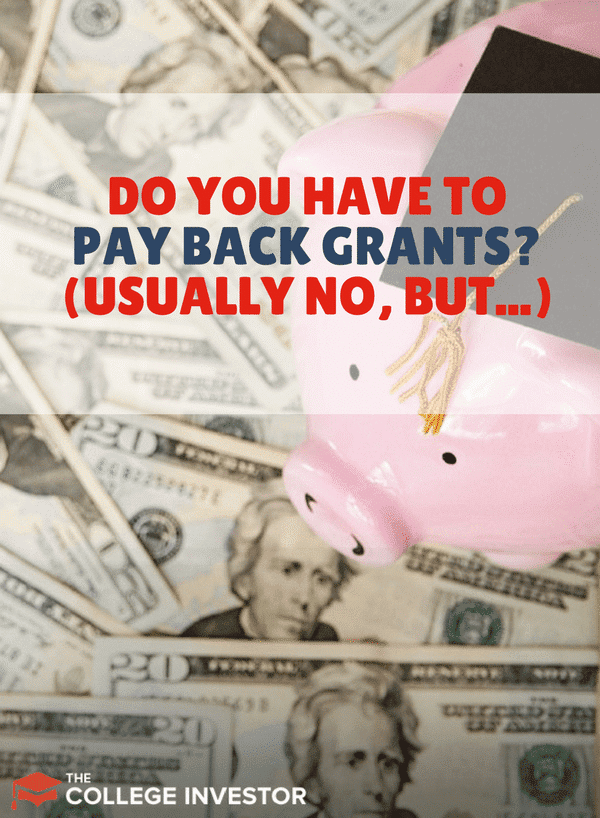
You typically don't have to pay back grants you receive as financial aid for college. However, there are some exceptions.
With the rising cost of college education, students pay for school using a combination of scholarships, family contributions, grants, and loans.
When you’re applying for financial aid, every dollar helps you get closer to your goals. Whether you’re attending college for the first time or returning to complete your education, take advantage of the financial aid options that are readily available to you based on your situation.
But what happens if you drop out of college? Do you have to pay back grants and other financial aid?
The U.S. Department of Education awards about $120 billion every year to help millions of students pay for college. This federal student aid is awarded in the form of grants, work-study funds, and low-interest loans.
If your grants have converted to loans, and you don't know what to do, check out the Student Loan Planner. The Student Loan Planner is a CFP that specializes in student loan debt and can help you navigate your loans. Check out the Student Loan Planner here >>
Financial Aid Options
When it comes to federal aid, there are three main types: grants, scholarships, and loans. Grants and scholarships are at the top of the list for the most attractive financial aid options.
Each category has its own terms for repayment. Eligibility for federal and state grants is determined when you fill out the FAFSA.
If you aren’t eligible for grants or scholarships, you might have to turn to federal or private loans for help with college tuition.
There are three types of federal student loans currently offered are Direct Subsidized Loans, Direct Unsubsidized Loans, and Direct Plus Loans.
If you’ve gone through all of your federal student loan options, you might need to apply for private loans to close the remaining gap for your education expenses. Private lenders will extend loans based on income and credit information.
However, private loans don’t offer the same benefits as federal student loans, such as forgiveness, fixed rates, and income-driven repayment plans. Explore your options for grants, scholarships, federal loans, and THEN private loans.
Loans consist of money that the student borrows to help pay for college, and must be repaid with interest. Unlike loans, grants do not have to be paid back under most circumstances. Explore all of your “free” options to avoid taking out too many loans and making these student loan mistakes.
If you are fortunate enough to receive a grant, do you have to pay it back? The answer might surprise you!
What Is A Grant?
According to the U.S. Department of Education, grants are sometimes known as “gift aid”, or free money to put towards your college education.
Grants are typically awarded on the basis of need and generally do not have to be repaid as long as you meet all of the obligations. You are eligible for grants based on your family's ability to pay, the cost of your education, and certain merit criteria.
There Are Four Types Of Federal Student Grants:
Federal Pell Grant
Originally named the Basic Educational Opportunity Grant, Pell Grants are distributed to students through their college, and colleges are given enough grant money to properly award all qualifying students.
A Federal Pell Grant is monetary aid from the U.S. federal government to undergraduate students who have not yet earned a bachelor’s degree. The maximum Federal Pell Grant award for the 2024-2025 award year is $7,395.
The actual award amount is based on the college’s cost of attendance, student’s enrollment status, the length of the academic year, and most importantly, the student’s financial need.
Students can receive the Federal Pell Grant for up to the equivalent of 12 semesters. As of 2023, low-income undergraduate students working toward a bachelor’s degree can receive up to $7,395 per year to pay for school.
The U.S. Department of Education determines need using a formula established by Congress. When determining need, the following factors are taken into consideration:
Federal Supplemental Educational Opportunity Grants (FSEOG)
These grants are awarded to undergraduate students with exceptional financial need up to the amount of $4,000 per year. The amount of the award is determined by the college’s financial aid office, and depends on the student’s financial need and the availability of funds at the college you attend.
Teacher Education Assistance for College and Higher Education (TEACH) Grants
Teachers pursuing a bachelor’s or graduate degree can receive up to $4,000 per year in grants provided that they agree to teach at a low-income school for four consecutive years.
Otherwise, the grant will covert into a loan, which must be repaid.
Iraq and Afghanistan Service Grants: If your parent or guardian was a military member of the military that passed away during their service in Iraq or Afghanistan, you could receive up to $6,495 per year. This grant is only available if you are otherwise ineligible for Pell Grants.
State-Issued Grants:
Aside from grants from the federal government, you may also be eligible for state funded grants.
How Are Grants Different From Scholarships?
Although grants and scholarships share similar characteristics, grants are usually based on financial need, whereas scholarships are based on merit.
While there are some federal scholarships based on need, most states, colleges, and other private organizations provide scholarships based on merit.
Grants and scholarships are the most sought after options because they are considered “free” financial aid”, meaning you don’t have to pay it back as long as you meet all of the conditions.
Once you take full advantage of grants and scholarships, you will have take out fewer loans to cover your education.
Like most college students, you will probably not receive enough grants and scholarships to cover all of your costs. To close the gap, students get a job, borrow or accept money from their family, or take out loans.
Loans provide a convenient way to cover any gaps, but you must repay them, so consider grants and scholarships first. Read and understand your award letter so that you properly follow the terms and conditions for all aid.
Scholarships
Like grants, scholarships are a form of “gift “aid that does not have to be repaid as long as you meet all of the obligations associated with the scholarship.
Scholarships can be based on your major, athletic ability, scholastic ability, religious affiliation, or other criteria.
A huge range of organizations, including schools, employers, individuals, private companies, nonprofits, communities, religious groups, and professional and social organizations offer scholarships.
Scholarships can range from small amounts to large awards that cover the cost of your tuition. Unlike grants, many organizations usually award scholarships based on merit, such as good grades or athletic excellence, rather than financial need.
For this reason, scholarships will not hurt your overall financial picture under most circumstances.
While you can receive scholarships from your school, receiving awards from other organizations requires more effort.
To find potential scholarships, see your high school counselor or a TRIO counselor if you are still in high school. You can also visit your state’s grant agency and check out your library’s reference section. Certain business groups, community organizations, and interest-related organizations are great resources as well.
Although most scholarships don’t have to be repaid, some scholarships require you to meet certain conditions, such as maintaining a minimum GPA, otherwise, your risk losing your award.
Student Loans
Unlike grants and scholarships, loans are money that you borrow and pay back with interest. In most cases, you must repay your loans even if you don’t complete your degree, or run into financial difficulty. This is why grants and scholarships are recommended as your first choice over loans.
Federal student loans are awarded based on the information you submitted on your FAFSA. Federal loans have benefits such as access to forbearance, deferment, and income-driven repayment plans. They also tend to have lower interest rates.
Circumstances Where You Have To Pay Back Grants
Pell Grants don’t need to be paid back as long as you follow the government’s requirements. However, you would have to repay a Pell Grant under three circumstances:
1. Withdrawal From The Program Or School
If you receive a grant and drop out before 60 percent of the semester is over, the government will ask you to return 50 percent of the “unearned’ portion of their money. This unearned portion depends on when in the semester you drop out.
For example, if you get a $2,000 Pell Grant, but you drop out halfway through the semester, you did not earn half ($1000) of your grant, and the government will want 50% of the grant (in this case, $500) paid back. However, if you drop out at 60% of the semester, the government believes you have earned your full Pell amount and do not have to pay it back.
2. A Change In Your Enrollment Status
If your enrollment status changes after you receive your Pell funds, you have to pay back the difference. For example, if you go from full-time to part-time, you have to pay back the difference. Otherwise, you will get a “Pell Overpayment” on your record, which disqualifies you from receiving future federal aid.
3. Your Financial Need Is Reduced By Other Aids Or Grants
Although this is a rare occurrence, it’s worth mentioning. If you submit your FAFSA, get a Pell Grant, and then get additional non-federal grants and scholarships that reduce your need for the Pell Grant, the government could ask for some of the money back.
By law, your total financial aid cannot exceed the cost of attendance by more than $300. Your additional grants and scholarship usually affect campus-based aid first, not the Pell Grant. Also, be sure that you are treated fairly by colleges in determining your financial need.
Final Thoughts
When it comes to financial aid, read the fine print and meet all of the terms and conditions. As long as you don’t change your enrollment status or withdraw, you should be fine.
Although you don’t normally have to repay grants, there are some exceptions. For example, if you withdraw from a program or change your student status from full time to part time, you might have to repay your entire grant or a portion of your grant.
Remember, when it comes to college tuition, select the option that leaves you with low or no debt.
Did you receive grants while you were in college? Did you ever have to pay them back due to special circumstances? Tell us in the comments below!

Robert Farrington is America’s Millennial Money Expert® and America’s Student Loan Debt Expert™, and the founder of The College Investor, a personal finance site dedicated to helping millennials escape student loan debt to start investing and building wealth for the future. You can learn more about him on the About Page or on his personal site RobertFarrington.com.
He regularly writes about investing, student loan debt, and general personal finance topics geared toward anyone wanting to earn more, get out of debt, and start building wealth for the future.
He has been quoted in major publications, including the New York Times, Wall Street Journal, Washington Post, ABC, NBC, Today, and more. He is also a regular contributor to Forbes.
Editor: Clint Proctor Reviewed by: Chris Muller
